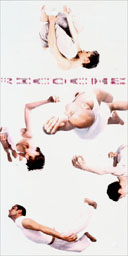
In the independent dance world, it's usually the choreographers who call the shots. Ricochet's unique position as a dancer-led company, picking and choosing guest choreographers to create its repertory, gives it an enviable freedom. But it's a freedom that cuts both ways. While Ricochet's regular turnover of new styles and personalities keeps its performers supple and alert, it also increases the chances of buying an occasional turkey. And the latest double bill of work by Stephen Petronio and Gary Carter lands it with a brace.
If you concentrate hard on Petronio's House of Magnet, you see some genuinely interesting dance ideas at play. Petronio's response to Ricochet's small-scale operations is to challenge his own natural tendency to blaze steps across a huge space. In this piece, he herds the five dancers into tense, wary clumps, pressuring their energy into tight angles and curves that slot into dense configurations. It's as if a giant force field is surrounding the dancers, and even when they break free on a wild riff of jumps or turns, the dark, introvert energy of the piece keeps sucking them back in.
Ricochet's dancers take readily to the abrasive, sullen virtuosity of Petronio's style, but they're hardly flattered by it. This work is relentlessly hard to watch. There's little gradation and absolutely no contrast within the airless intensity of its language, and David Linton's accompanying electronic score, brutalised by static and feedback, grinds in the background like a bad headache.
If Petronio's work has too much activity impacted within too small a space, Carter's The Enigma of Sin struggles to formulate a single coherent motif. His basic concept is to present God and various other Biblical principals in a series of music-hall turns, modulating their patter into surreal theological vignettes and the occasional confessional outburst.
A glimpse of how good this piece might have been is offered by a scene in which God appears in a fake body corset (the word made flesh), trembling in feeble anguish as his various creations - Eve, Jesus, Lucifer, the angel Michael - run amok around him. The image of all this deviant energy unloosed from Pandora's box of free will is starkly and wittily shaped. Elsewhere, though, the piece merely tinkers with half-baked jokes, vaguely subversive images and theology that isn't so much enigmatic as lazy.
At the Corn Exchange, Brighton (01273 709709), on Friday, and the Lemon Tree Theatre, Aberdeen (01224 642230), on November 9.

